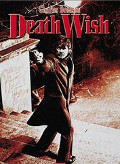
Directed by
Michael Winner
93 minutes
Rated MA
Reviewed by
Bernard Hemingway

Death Wish
This modest film was a huge hit in its day and sparked a lot of controversy with respect to its apparent condoning, if not outright encouraging, of urban vigilantism.
In his most iconic role, Charles Bronson plays Paul Kersey, a liberal-minded architect living in middle-class comfort in New York City. One day, a group of thugs (one whom is a very young Jeff Goldblum) break into his apartment (its décor is fabulous '70s kitsch) while he's at work, killing his wife (Hope Lange) and brutally attacking his married daughter (recalling a similar scene done much better by Stanley Kubrick four years earlier in A Clockwork Orange). As the police are unable to find the culprits, Kersey begins his own program of cleaning the streets of scum. Meanwhile Detective Frank Ochoa (Vincent Gardenia) is tasked with the job of finding the vigilante killer
Despite what you might think Death Wish is relatively low key in its depiction of vigilantism. Or at least so it seems with the benefit of hindsight. There is none of the pumped-up violence and consequent misplaced enjoyment in vicariously killing that we are now well familiar with. Rather it is a measured depiction of a man in pain and his way of dealing with it.
The script by Wendell Mayes from a novel by Brian Garfield takes considerable trouble in portraying Kersey as a liberal, an anti-gun proponent even, who was a conscientious objector during the Korean War and it is quite canny in relating his change of character to the myths of American manhood as enshrined in Wild West films. Giving approximately half the running time to establishing Kersey’s profile and justifying his actions there is certainly no simplistic, crowd-pandering exhortation to violence here. When Kersey kills his first victim he goes home and throws up. This is the only instance of a one-to-one confrontation and overall Winner’s depiction of the subsequent killings are depicted in the manner of the traditional Western. That is, matter-of-factly and not for any vicarious thrill but simply because that is what happens to bad guys.
The film’s title suggests a certain fatalism and psychologically Death Wish is about a character akin to that of Christopher Walken’s Nick in The Deer Hunter (1978). Kersey has been traumatized into numbness and engaged in risk-taking behaviour in order to revive a native virility lost in the strictures of modern urban society. Not that Winner's film is in any way of comparable dramatic substance and cinematic quality to Cimino's.(It also make an interesting companion piece to Scorsese's Taxi Driver which came out two years later).
The fact that, whatever approval it gets here, vigilantism didn’t become a popular activity as a result (nor subsequently in ever more sensationally violent films) is perhaps a good indication that there is no one-to-one relation between what is depicted on screen and an audience’s response to it. Or perhaps it is simply that emotionally the film is rather affectless, in part because Bronson is such an impassive performer and in part because the film is in essence a self-aware appropriation of the Western with no more claim on reality than that genre (there are nearly as many caricatural low-lives in Kersey’s Manhattan as in a Serge Leone Western).
FYI: There were four sequels in which Bronson reprised the same lead character with the usual diminishing rewards and a 2018 remake in which Bruce Willis played the role to no better effect.
Want something different?





